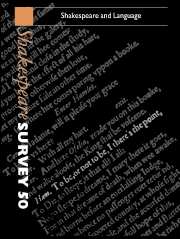Book contents
- Frontmatter
- Shakespeare’s Language and the Language of Shakespeare’s Time
- ‘I’ll plague thee for that word’: Language, Performance, and Communicable Disease
- The Language of the Spectator
- Marlowe’s Edward II: Penetrating Language in Shakespeare’s Richard II
- Hamlet’s Ear
- Secrecy and Gossip in Twelfth Night
- Shakespeare Rewriting Ovid: Olivia’s Interview with Viola and the Narcissus Myth
- ‘Voice Potential’: Language and Symbolic Capital in Othello
- Household Words: Macbeth and the Failure of Spectacle
- Erring and Straying Like Lost Sheep: The Winter’s Tale and The Comedy of Errors
- The ‘Shakespearian Gap’ in French
- Reading the Early Modern Text
- Shakespeare and the Metamorphosis of the Pentameter
- Rereading Illustrations of the English Stage
- Nietzsche’s Hamlet
- ‘Strange and woonderfull syghts’: The Tempest and the Discourses of Monstrosity
- Shakespeare Performances in England, 1996
- Professional Shakespeare Productions in the British Isles, January–December 1995
- 1 Critical Studies
- 2 Shakespeare’s Life, Times, and Stage
- 3 Editions and Textual Studies
- Books Received
- Index
Professional Shakespeare Productions in the British Isles, January–December 1995
Published online by Cambridge University Press: 28 March 2007
- Frontmatter
- Shakespeare’s Language and the Language of Shakespeare’s Time
- ‘I’ll plague thee for that word’: Language, Performance, and Communicable Disease
- The Language of the Spectator
- Marlowe’s Edward II: Penetrating Language in Shakespeare’s Richard II
- Hamlet’s Ear
- Secrecy and Gossip in Twelfth Night
- Shakespeare Rewriting Ovid: Olivia’s Interview with Viola and the Narcissus Myth
- ‘Voice Potential’: Language and Symbolic Capital in Othello
- Household Words: Macbeth and the Failure of Spectacle
- Erring and Straying Like Lost Sheep: The Winter’s Tale and The Comedy of Errors
- The ‘Shakespearian Gap’ in French
- Reading the Early Modern Text
- Shakespeare and the Metamorphosis of the Pentameter
- Rereading Illustrations of the English Stage
- Nietzsche’s Hamlet
- ‘Strange and woonderfull syghts’: The Tempest and the Discourses of Monstrosity
- Shakespeare Performances in England, 1996
- Professional Shakespeare Productions in the British Isles, January–December 1995
- 1 Critical Studies
- 2 Shakespeare’s Life, Times, and Stage
- 3 Editions and Textual Studies
- Books Received
- Index
Summary
Most of the productions listed are by professional or semi-professional companies. Information is mainly taken from newspaper reviews held in the Birmingham Shakespeare Library. There were an exceptional number of productions of Macbeth, many reflecting the civil war in Bosnia. By contrast, only one professional production of King Lear was recorded.
ALL'S WELL THAT ENDS WELL
The Nuffield Theatre, Southampton: November 1995
Director: Patrick Sandford
Designer: Farnsworth
A modern dress production.
ANTONY AND CLEOPATRA
Moving Theatre Company
The Riverside Studios, Hammersmith, British and European tour: April 1995
Director/Cleopatra: Vanessa Redgrave
Re-cast during the tour. Also performed in Wormwood Scrubs Prison.s
Northern Broadsides, tour: November 1995—
Director/Antony: Barry Rutter
Designer: Jessica Worral
AS YOU LIKE IT
Cheek by Jowl, tour continues.
See Shakespeare Survey 48.
The Midsommer Actors, Arundel Festival and tour: June 1995—
A walkabout production, touring open air venues. The native inhabitants of the Forest of Arden were presented as Native American Indians.
Tamara Theatre at the Dudley Shakespeare Festival, Dudley Castle: summer 1995
Director: Robert Leach
Rosalind: Sonia Ritter
Tamara are a new theatre company, and intend to perform Shakespeare annually at Dudley Castle.
Scapegoat Theatre Company, Norwich, tour of open air sites around Norwich: June 1995
Stafford Shakespeare Company, Stafford Castle: July 1995
Director: Rob Swinton
Set in 18th century pre-Revolutionary France, and performed by a mixed amateur and professional cast.
Hot Air Productions, The Oxford Shakespeare Festival: July 1995
A and BC Theatre: August 1995
Director: Gregory Thompson
The change of location from Court to Forest was effected by costume changes, signalling that essentially they were the same place.
- Type
- Chapter
- Information
- Shakespeare Survey , pp. 225 - 236Publisher: Cambridge University PressPrint publication year: 1997

